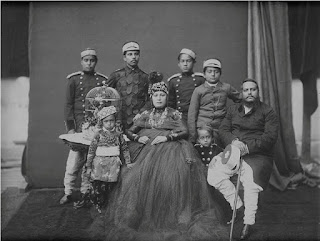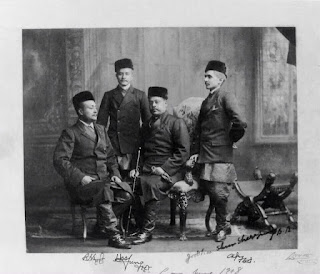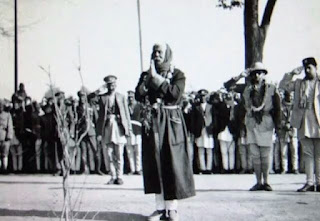By Subodh Rana.
The 104 years of Rana Regime of Nepal reviled today as a monolithic juggernaut from without was anything but when viewed closely from within. The struggle for power within the family was as acute as those among the Roman emperors or Mughal rulers. Out of the nine Rana prime ministers only four died while in office, one was assassinated, two were prematurely ousted from office, the last one had to step down to give way to proto-democracy. Only one among the nine actually resigned voluntarily while in office. This is his story.
 |
| Maharajah Juddha Shumsher |
So why did Maharajah Juddha Shumsher Jung Bahadur Rana resign bucking the trend? Was it because he was afraid that he would be ousted like one of his predecessor Maharajah Dev Shumsher? Was he afraid that there was some nefarious plot to assassinate him like his uncle Maharajah Ranauddip Singh? When one makes a decision of such magnitude, there must have been multiple factors influencing him to come to such a decision. Had he not resigned Maharajah Juddha Shumsher J. B. Rana would have been the last Rana prime minister of Nepal if we maintain the trajectory of history as it is and end the Rana regime in 1951 A.D. Juddha passed away peacefully in Dehra Dun in India in 1952 A.D.
One must start investigating by learning who he really was at birth. One of the youngest sons of Commander-in-Chief Dhir Shumsher Jung Bahadur Rana from his morganatic wife Juhar Kumari reportedly from Kangra, Juddha was not born a Roll-wallah, but was added to the Rana nomenclature at the time of his eldest brother Maharajah Bir Shumsher reportedly by a death-bed wish of his father Dhir. It can be surmised that Bir was only too willing to fulfill his father’s wish as, at the same time, he also raised the status of his children from his second Newari wife to the Roll of Succession to the tile of Maharajah of Kaski and Lamjung and Prime Ministership of Nepal. Nearly of the same age Juddha grew up together with his nephews Rudra, Dharma and Pratap, Bir’s children from his second wife.
 |
| Maharajah Bir with his second wife and children |
Juddha was brought up by his foster mother Maharani Karma Kumari the first wife of his elder brother Dev Shumsher who succeeded Bir as prime minister of Nepal. Juddha paid equal reverence to his foster mother as to his own as testified by the two statues he built for them and placed them at the Jawalakhel Zoo, Nepal’s first and only zoo which was inaugurated by Juddha amidst great fanfare. Juddha knew that karma was very important in guiding one’s destiny and he, like many of his contemporaries, had a fatalistic approach to life and regarded the quest for the hereafter to a greater degree.
Although raised to the status of “A” Class Rana and listed in the Roll of Succession he was one of the youngest in line to the title of Maharajah of Kaski and Lamjung and the post of Prime Minister of Nepal. Perhaps in his younger days he never even thought once that one day he would inherit the title and the post. He could have never known that after Bir, Dev would be removed from his post by his own younger brother Chandra. Chandra Shumsher ruled for 31 years and died in office. His younger brother Bhim succeeded Chandra at an old age and he ruled for only 5 years until he died in office due to natural causes. Juddha succeeded Bhim at the age of 58 and became the next dictator of Nepal.
An ascetic living in the Resunga hills of Gulmi district of western Nepal had once correctly – as it turned out – prophesied that Juddha would one day become the ruler of Nepal, perhaps to disbelief on the part of many, including himself. But his prophesy came true and since then Juddha started to consult Resunga Mahaprabhu frequently and even brought him to Kathmandu near the seat of power. As a young boy I recall the ascetic with white silken skin, piercing eyes and white thinning beard flowing down to his knees doing samadhi meditation in Pashupatinath and my father would occasionally visit him there. Was Juddha tricked into retirement by some treachery of his nephews in cahoots with the ascetic clairvoyant? They took stock aghast of some of the liberalization Juddha had brought to social life and the economy. There is a story that has the ascetic Resunga advising Juddha that he had just one more year to live and so it was better to retire from politics and gain spiritual wealth.
 |
| Juddha, seated in centre, with Rudra seated on his right |
One of the first acts of Juddha upon assuming high office was to change the Roll of Succession earlier carried out by Bir and Bhim and take the children of his brothers born out of secondary wives out of the Roll. Did he do this out of his own volition or was it due to intense pressure from his ambitious nephews, the wealthy and powerful sons of Chandra pining for the high office. Juddha removed his second in line Commander-in-Chief Rudra Shumsher, the eldest son of Bir from his second wife from the post and banished him to Palpa. So were the sons of Bhim Shumsher removed from the Roll and banished to various parts of the country, away from Kathmandu, by giving them governorship of far flung lands.
This act is a mystery very hard to unravel. Why did Juddha betray Rudra his childhood friend? Why did he undo the decision taken by the Bhardari Sabha (Privy Council) of Bir his brother who had generously enlisted him Juddha as well in the Roll? Was it due to the pressure from the sons of Chandra Shumher? Did he genuinely think that what he was doing was just and good for the Rana dynasty? Did Juddha repent this decision later and did it play a role in his resignation?
The third angle we need to closely look at is the geopolitics of the time. Since his rule began there was a tremendous movement in India started by Mahatma Gandhi to force the British to give self-rule (swaraj) to India. Many of the politically inclined from Nepal had also gone over to India to support Gandhi in this movement and eventually created political awareness too back home aimed against the dynastic Rana regime, closely linked in their eyes to the British Raj in India. It was during this period of political agitation that some of the ring leaders against Rana rule were charged with sedition and given the death penalty. Four of them have since been celebrated as martyrs after the Rana regime collapsed in Nepal.
 |
| Retired Maharajah Juddha with Pandit Nehru in Dehradun,
my father General Kiran at the left of picture |
Juddha must have known that soon the British would be forced out of India and give India its independence which would in turn spell doom upon the Rana regime. Although he maintained personal relationship with the Indian freedom movement and Pandit Jawaharlal Nehru and other leaders, the trajectory of history would not leave the Rana regime intact. Perhaps he thought that he would resign before the inevitable happened. He took destiny into his own hands and decided that it would be better to voluntarily leave power than to be ignominiously shunted out.
29 November 1945 dawned bright and clear. Maharajah Juddha summoned all the civil and military high ranking officials of Nepal for a special ceremony at Singha Durbar, the official abode of the Rana prime minister of Nepal. This day he would voluntarily hand over the headgear or Sarpech of the Maharajah of Kaski and Lamjung and the post of prime mister to Commander-in-Chief Padma Shumsher Jung Bahadur Rana. He would from then on be known as Rajarishi (Raj-rishi) Maharaj, one who in an act of ultimate glory uncrowned himself and decided to live the life of an ascetic in spiritual quest and penance just like his mentor Resunga Mahabrabhu. At the time he did not know that he would live until 1952 A.D., for another 7 years instead of the one prophesied.
 |
| Maharajah Juddha bidding farewell to his posts and titles |


